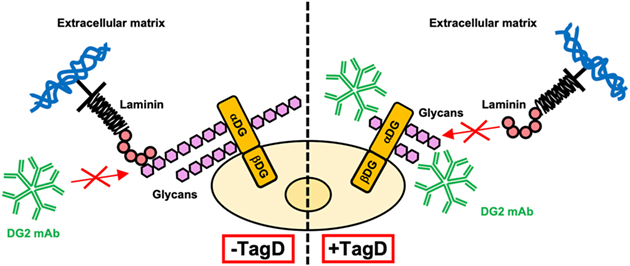α-Dystroglycan (α-DG) is a glycoprotein specifically modified with O-mannosyl glycans bearing long polysaccharides, termed matriglycans, which comprise repeating units of glucuronic acid and xylose. The matriglycan is linked to the O-mannosyl glycan core through two ribitol phosphate units that can be replaced with glycerol phosphate (GroP) units synthesized by fukutin and fukutin-related protein that transfer GroP from CDP-Gro. Here, we found that forced expression of the bacterial CDP-Gro synthase, TagD, from Bacillus subtilis could result in the overproduction of CDP-Gro in human colon carcinoma HCT116 cells. Western blot and liquid chromatography-tandem mass spectrometry analyses indicated that α-DG prepared from the TagD-expressing HCT116 cells contained abundant GroP and lacked matriglycans. Using the GroP-containing recombinant α-DG-Fc, we developed a novel monoclonal antibody, termed DG2, that reacts with several truncated glycoforms of α-DG, including GroP-terminated glycoforms lacking matriglycans; we verified the reactivity of DG2 against various types of knockout cells deficient in the biosynthesis of matriglycans. Accordingly, forced expression of TagD in HCT116 cells resulted in the reduction of matriglycans and an increase in DG2 reactivity. Collectively, our results indicate that DG2 could serve as a useful tool to determine tissue distribution and function of α-DG lacking matriglycans under physiological and pathophysiological conditions.

 Institute of Biological Chemistry, Academia Sinica
Institute of Biological Chemistry, Academia Sinica
